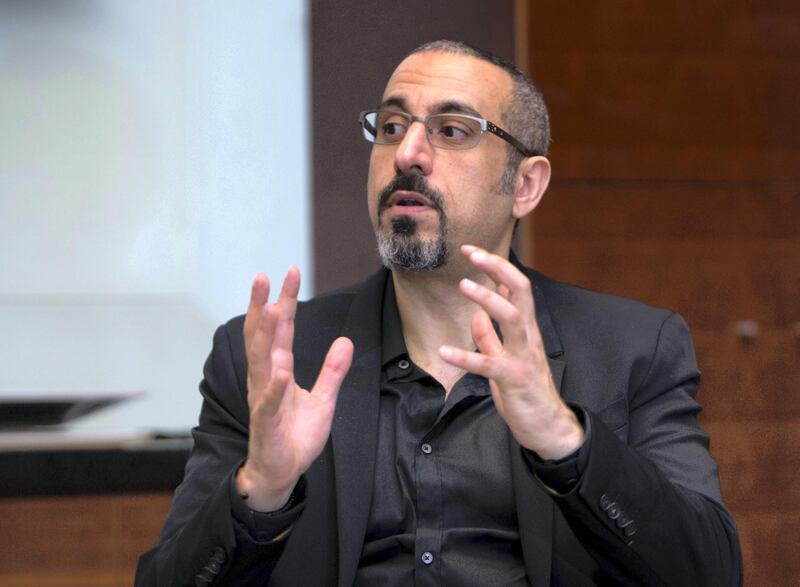What is more difficult than coming up with a hit television show? If you ask Ahmad Al Shugairi, he will tell you it's deciding what to do next. The affable Saudi Arabian TV personality says he has been in a state of flux ever since his popular Ramadan lifestyle series Khawatir ended its 11-season run in 2015.
He tells The National that a lot of that is because of his unexpected celebrity, with the Saudi becoming one of the most popular television personalities in the Arab world. But he is clearly uncomfortable with his fame. "It was absolutely the last thing on my mind," Al Shugairi says with a sigh.
"The fact our show, which really didn't have a concept, became this huge thing surprised everyone. What started out as a small idea became very consuming and I worked so hard until I became totally emotionally and physically exhausted."
After spending about two years working the odd TV job, Al Shugairi decided to take a break. He picked "a small dot of an island" in the Pacific, packed a camera, notepad and reading material and decamped to a beach shack (food was provided) for 40 days of isolation to reflect and meditate.
"It really came from this idea of me wanting to resolve my inner struggles," he says. "I felt that one of the ways to do that is to detach myself from all my surroundings. This means no iPhone, no messaging, no internet and so forth. This allowed me to focus on analysing myself and resolving my struggles."
A time for thoughts
The result of his getaway is his latest book, 40. Al Shugairi marked the release of its third edition with a sold-out talk at the Emirates Airline Festival of Literature in Dubai and the book, which is written in Arabic, is a handy addition to your Ramadan reading list.
It is comprised of 12 chapters made up of his reflections on what he read in the Quran and other inspirational books during his time on the island, as well as how he confronted his doubts and loneliness abroad. Each section is comprised of 40 bite-sized thoughts and anecdotes inspired by his experience.
With its large size, clear formatting and minimal design, it almost resembles a school textbook. He understands the comparison. With his fanbase comprised mainly of young Arabs, Al Shugairi wanted the work to be presented in a practical way.
"I wanted to appeal to a wider audience, even if they're not readers," he says. "The book appeals to all and one of the ways it does that is to make it non-consequential. You can read it from anywhere. If you don't like a part, you can simply skip it and go somewhere else."
That laid-back approach was influenced by his island experience. "I had a lot of time on my hands," Al Shugairi says with wry laugh. "So I kept a detailed diary of what I was thinking and feeling, and these gave me the idea to turn that experience into a book."
But it was not quite so straightforward. While many people harbour fantasies of walking out of jobs and writing a book while living a tech-free existence on a remote island, Al Shugairi says both he and his family had to prepare mentally for his move. He not only had to trust his family and colleagues to look after his personal and professional affairs, but he had to ensure they could reach them if they needed to. "I had a satellite phone and I gave the number to my family and manager," he says. "But I was only to be contacted in an emergency."
What did he learn most from the experience? "I learnt a lot about myself, such as I am presently going through a midlife crisis," says Al Shugairi, 45. "And I feel that I have been going through that for the past four years, actually. I still haven't found the answers, but I am working on it."
The ground-breaking success of Khawater
Born in Jeddah and educated in the US, Al Shugairi was chosen by the Dubai-based Pan Arab broadcaster MBC to host the youth affairs programme Yalla Shabab in 2002. When the show ended in 2005, he was invited by the broadcaster to pitch another youth-focused programme. Al Shugairi filmed three short, quirky segments in which he discussed various cultural and social aspects of Islam. MBC were intrigued by the content and approved a series, including it as part of its 2005 Ramadan coverage.
It is easy to understand why Khawatir, which means "reflections" in English, was an immediate hit in the region. Here was a show that was markedly different to the plethora of spiritual programmes that were broadcast on the small screen during the holy month.
While those programmes, which often featured religious scholars, addressed the teachings of Islam in a dry and strait-laced manner, Khawatir took a comparatively radical approach. There were no long-winded discussions or myriad talking heads. Instead, each episode – and particularly in the early seasons, when shows could be as brief as five minutes long – was zippy and innovatively edited, as Al Shugairi focused on one hot-button topic that was being widely discussed in Saudi Arabian society and the wider Muslim diaspora.
While other programmes discussed Islam from the perspective of theology, Khawatir focused on the details and captured the attention of Arabs desensitised to religious programming. Al Shugairi's decision to address topics such as the disorderly manner in which shoes are left at mosques before prayers, the condition of some mosque toilets, the treatment of domestic workers and how we interact with the opposite sex struck a chord not only with young people across the region, but the wider Muslim population as well.
Al Shugairi says Khawatir was nothing short of ground-breaking. "The programme was discussing things that many of us were already talking about, such as why the bathrooms in some mosques are filthy, but in a restaurant they are clean," he says. "These are everyday discussions and the comparisons that the show was making was the first time it was talked about on television.
"Some of the topics that we challenged have become so mainstream that no one really thought about it before. When I ask people about why they throw their shoes on the floor and make it look like a jungle outside the mosques, they say that's what they always do. But what are the shoe racks for? I ask. A lot of the show was spent discussing these commonsense issues."
The Satellite Sheikh
The success of the show inspired Al Shugairi to take on more ambitious topics – and extending each episode to a run-time of 20 minutes – including health, technology, travel (some episodes explored Japanese society) and sustainability.
While the show was a hit in the Arab world, Al Shugairi did not expect the reaction it received from overseas. Not only did some foreign journalists praise the show for presenting an insight into the lives of young people in Saudi Arabia and the subjects that concern them, but Al Shugairi was commended for his ability to connect with them. The New York Times even went as far as describing him as a "satellite sheikh", a distinction that does not appeal to the presenter.
Al Shugairi says he never viewed or tried to represent himself as a religious teacher. "I still don't view myself as a writer even though I wrote a few books," he says.
He dealt with his growing fame by maintaining a low profile. "That's how I am generally. I don't involve my family in the media, so I do have a very private life. I rarely go out in public. I avoid going out and making a fuss somewhere. I try to remind myself that it's all fake," he says.
"When people talk about you, it can be seductive. It can inflate your ego and you start to think you are special. But that's not the case. It simply happens to be that the spotlight is on you at this particular time for a reason."
His latest book is full of such direct observations and continues Al Shugairi's mission to inspire the next generation of young Muslims to strive to become their best selves, even if right now his own path seems unclear.
40 by Ahmed Al Shugairi, published by Arab Scientific Publishers, Inc, is out now








